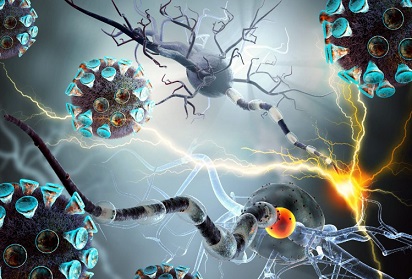Post-Mild Or Asymptomatic COVID-19 Infections Still Exhibit Ongoing Neuron And Astrocyte Injury Even At 10 Months Follow-Up!
Nikhil Prasad Fact checked by:Thailand Medical News Team Mar 18, 2024 1 year, 10 months, 3 weeks, 4 days, 1 hour, 22 minutes ago
COVID-19 News: The COVID-19 pandemic has been a global health crisis with far-reaching impacts on individuals' physical and mental well-being. One area of growing concern is the potential long-term effects of mild or asymptomatic COVID-19 infections on the central nervous system (CNS). In this
COVID-19 News report, we delve into a recent study by Italian researchers from Neuroscience University of Siena, University of Bari Aldo Moro and University of Naples Federico II, Naples that explored the intricate relationship between COVID-19 and neuronal/glial damage, analyzing injury biomarkers and cognitive impacts.
 Post-Mild Or Asymptomatic COVID-19 Infections Still Exhibit Ongoing
Post-Mild Or Asymptomatic COVID-19 Infections Still Exhibit Ongoing
Neuron And Astrocyte Injury Even At 10 Months Follow-Up!
Biomarkers of CNS Damage
Neurofilament light chain (NfL) and glial fibrillary acidic protein (GFAP) have emerged as crucial biomarkers for assessing CNS damage in various neurological conditions, including COVID-19. Serum levels of these biomarkers, termed sNfL and sGFAP, respectively, reflect ongoing neuronal and glial injury. The use of advanced immunoassay methods has enabled precise measurement of these biomarkers in serum, providing insights into COVID-19's neurological impact.
Cognitive Impacts of Mild COVID-19
Recent studies have highlighted cognitive deficits in individuals with mild or asymptomatic COVID-19 infections. These deficits can affect executive functions, attention, memory, and overall cognitive performance. Understanding the cognitive consequences of COVID-19 is vital for guiding post-infection management and facilitating individuals' return to work.
Study Design and Methodology
A cohort study involving 147 adult workers with previous asymptomatic SARS-CoV-2 infection or mild COVID-19 was conducted. The study assessed sNfL and sGFAP levels at two time points: one week and ten months after test negativization. Cognitive performance was evaluated using standardized measures, including the Cognitive Failure Questionnaire (CFQ).
Initial Findings: Elevated Biomarker Levels
At the first assessment (T0), COVID-19 patients exhibited significantly elevated levels of sNfL and sGFAP compared to age and BMI-matched healthy controls (HCs). This initial elevation in biomarkers indicated ongoing neuronal and astrocytic damage even in mild or asymptomatic cases of COVID-19.
Associations and Correlations
The study also identified associations and correlations between biomarker levels, demographic factors (such as age), and lifestyle factors (such as alcohol consumption). Higher biomarker levels were observed in COVID-19 patients with cognitive impairment, suggesting a link between CNS damage and cognitive deficits post-infection.
Long-Term Follow-Up: Persistence of Biomarker Elevation
Ten months post-infection (T1), whi
le there was a reduction in sNfL and sGFAP levels compared to T0, biomarker levels remained significantly higher than in HCs. This persistence of elevated biomarkers indicated ongoing neuronal and glial damage even after the resolution of COVID-19 infection.
Cognitive Outcomes at Follow-Up
Interestingly, self-reported cognitive impairment worsened in some individuals at T1 compared to T0, highlighting the complex nature of cognitive deficits post-COVID-19. These findings underscored the need for continued monitoring of cognitive function in individuals recovering from mild or asymptomatic COVID-19.
Implications for Returning to Work
The study's results have significant implications for individuals returning to work after mild or asymptomatic COVID-19 infections. Cognitive deficits observed in these individuals may impact job performance, particularly in roles requiring high cognitive demands, such as academic or administrative positions.
Future Research Directions
Further research is warranted to elucidate the mechanisms underlying ongoing neuronal and glial damage post-COVID-19. Longitudinal studies tracking biomarker levels and cognitive function over extended periods can provide valuable insights into the long-term consequences of CNS damage in COVID-19 survivors. Additionally, exploring the impact of job-specific characteristics on cognitive outcomes post-infection is essential for designing targeted interventions and support systems for returning workers.
Conclusion
In conclusion, mild or asymptomatic COVID-19 infections can lead to persistent neuronal and glial damage, as evidenced by elevated biomarker levels even after infection resolution. Cognitive deficits observed in these individuals underscore the need for comprehensive monitoring and support during the recovery phase, especially in occupational settings where cognitive performance is crucial. Continued research into the long-term effects of COVID-19 on CNS health and cognitive function is essential for optimizing post-infection management strategies and promoting individuals' well-being as they resume their professional responsibilities.
The study findings were published in the peer reviewed journal: Scientific Reports (Nature).
https://www.nature.com/articles/s41598-024-57093-z
For the latest
COVID-19 News, keep on logging to Thailand Medical News.
